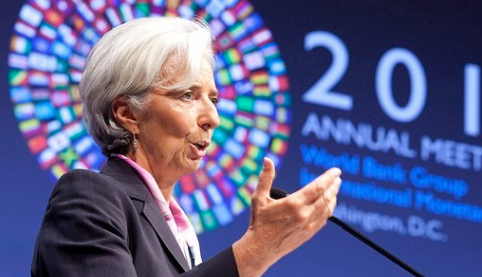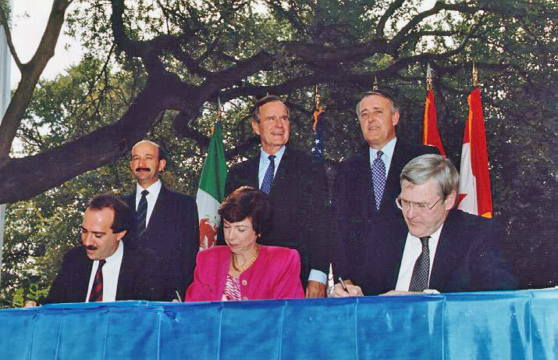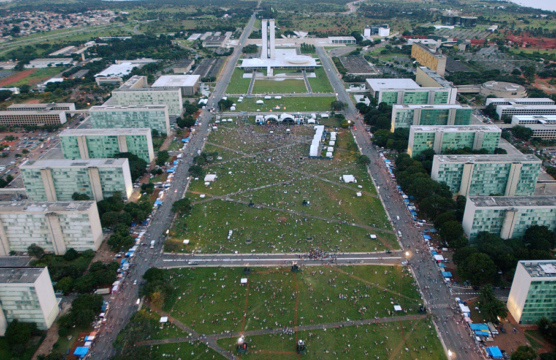The FTA, Not Such a Happy Story
Someday, someone will write the objective history of the US-Colombia free trade agreement For the US, the history is not a happy one.
A Daily Publication of The Dialogue
The International Monetary Fund’s managing director, Christine Lagarde, warned this month in an interview with the Financial Times that emerging markets could suffer a “shock” due to the escalating trade war between the United States and China. While Lagarde said her staff does not yet see widespread contagion, developing countries are facing threats due to rising “uncertainty” and a “lack of confidence,” she added. How are trade tensions between the United States and China affecting Latin American countries? Which countries and industries stand to gain or lose the most? How should countries in the region protect themselves against the fallout from external factors such as friction over trade?
Miguel Braun, trade minister of Argentina: “It is clear that the current trade tensions generate uncertainty, and emerging markets generally suffer more in times of uncertainty. At the same time, and although it is important to follow events closely, the current situation is not as dire as others faced in the past. Despite the current tensions, the world seems to continue to support the integration process. Trade now represents more than half of global GDP, there are close to 300 trade agreements in place today when they only numbered 25 in 1990 and many countries continue to negotiate agreements, as we’ve seen between Japan and the European Union, for example. In this context, Argentina continues in its course toward stronger integration, negotiating through Mercosur with the European Union, the European Free Trade Association, Canada, Korea and Singapore, and bilaterally with Chile, Colombia and Mexico, and advancing in intra-Mercosur issues. Argentina firmly believes in the need to strengthen the multilateral trading rules-based system and is doing its part toward that end from the presidency of the G20. In that sense, we are pleased that both the G20 ministerial meeting on investment and trade and the Global Steel Forum recently arrived at consensus reports.”
Anabel González, former senior director at the World Bank and former minister of foreign trade of Costa Rica: “Trade frictions are undermining confidence and threaten to derail economic recovery and depress medium-term growth prospects. Rising protectionism and uncertainty are already taking a toll on investors, markets and supply chains, while eroding the rules-based global trading system. While the United States and China are at the center of this escalating confrontation, underlying systemic issues risk a broader impact. For Latin America, the prospects are troubling, given the region’s high trade dependence on both the United States and China, which collectively account for over half of its total trade. There is a view that Brazil, Argentina and other countries could benefit from the mounting trade standoff, with increased or new opportunities to reroute trade and supply the Chinese market—and maybe the U.S. market—and increased prices for some commodities such as soybeans. Similarly, some firms in the electronics sector may consider shifting production from China to other locations, including Mexico—though the outcome of the NAFTA renegotiation would certainly weigh on this. It is not that clear, though, how this will play out. Not only is the impact of tariffs on a given industry dependent on the microeconomics of the specific product and supply chain, but more importantly, it is not evident what the duration or outcome of this ongoing U.S.-Chinese trade confrontation will be. There are at least three possible trade scenarios to consider: a full-fledged trade war, a managed-trade grand bargain and the progressive deterioration of multilateral governance. In all of them, Latin America stands to lose from a return to a trading system in which power and politics, rather than market competition, allocate resources and inform business decisions. Be it through increased volatility and uncertainty in the first case, trade diverting and negative terms of trade effects in the second or just plain weakening of the rules and confidence erosion, the conditions would not be conducive to increased growth in the region.”
Andrés Rebolledo, former director of Chile’s general directorate of international economic relations and former minister of energy of Chile:“Every week, we have new episodes of the trade war. A long saga, which could be defined as the ‘new cold war,’ starring China and the United States awaits, one that reflects the reshuffle of and fight for technological, economic and political hegemony. In this context, Latin America could be seriously affected if protectionism is installed as the new norm in international markets. The skirmishes arrived in a good period for the global economy, during which central economies were growing together, as forecasts for 2018 showed before tariffs and retaliatory measures introduced uncertainty into the economic recovery. The Trump administration’s unilateral imposition of tariffs, which seeks to rebalance its trade deficit with China and other partners, is not only mercantilist, but also reflects internal economic unbalances that could potentially have an impact on the global economy. If the United States’ goal is to fix its trade balance, then its task is complex and potentially very disruptive given that it currently has a trade deficit with around 100 other countries. The main effect will be the weakening of global trade rules and the WTO, and thus, growing uncertainty in trade and investment, which will especially affect smaller countries like those of Latin America. This could slow the global economy, drive down demand for our exports and in turn negatively affect the prices of commodities that many regional countries rely on. Latin America will have to improve its integration with regional and global markets. It must deepen negotiations, particularly with Asia. Trade deals now operate as a sort of insurance as markets close. This the case with Chile, which has maintained its preferential access in China, the European Union, India and Turkey, thanks to existing FTAs. In sum, in this era of weakened multilateralism and more regional deals: those who don’t negotiate, will lose.”
Ignacio Bartesaghi, dean of the business studies department at the Catholic University of Uruguay: “Trade tensions between China and the United States will have systemic effects on international trade by affecting economic growth as well as business uncertainty, which has already been reflected in stock markets and investors’ decisions. Likewise, and this might be the greatest threat, it will affect the current multilateral trade system as the Trump administration imposes a new paradigm that could change the trade rules that have governed international trade over the past 60 years. There would be an even greater risk if the conflict expands to the European Union, which has been successful in mitigating the effects of Trump’s steel and aluminum tariffs. Any analysis on the global trade war must consider the underlying factor behind, which is far from being the United States’ trade deficit. Definitively, it is a bid for international leadership, with the Asian power evidently posing a threat. This component, more geopolitical than commercial, in addition to the aggressive and unpredictable policies of the Trump administration, complicate any predictions of the impact or extent of trade tensions in the coming months. Although we have reached a new phase in the conflict, in which the United States will impose new tariffs and China will respond accordingly, internal pressures by American producers and consumers will progressively set limits to Trump’s actions and will open the way for dialogue between the two countries. In any case, it is likely that we are facing a new stage of international trade rules, which will have unclear results.”
The Latin America Advisor features Q&A with leaders in politics, economics, and finance every business day. The publication is available to members of the Dialogue's Corporate Program and others by subscription.
Someday, someone will write the objective history of the US-Colombia free trade agreement For the US, the history is not a happy one.
How significant of a priority should strengthening NAFTA be as compared to other trade agreements?
Over the last two decades, Brazil’s trade policy has centered on two main negotiations. Progress on both fronts, however, has been limited.
 IMF Director Christine Lagarde // File Photo: International Monetary Fund.
IMF Director Christine Lagarde // File Photo: International Monetary Fund.

